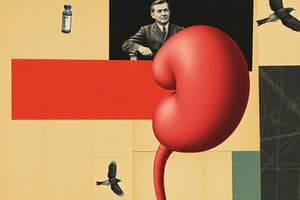Podcast
Questions and Answers
What is the primary role of insulin in the human body?
What is the primary role of insulin in the human body?
- To manage pain during diabetes
- To help cells absorb glucose from the blood (correct)
- To digest food particles in the stomach
- To produce glucose in the liver
Which type of diabetes is characterized by a lack of insulin production?
Which type of diabetes is characterized by a lack of insulin production?
- Type 1 diabetes (correct)
- Prediabetes
- Gestational diabetes
- Type 2 diabetes
Who proposed the idea of tying off pancreatic ducts to isolate insulin-producing tissue?
Who proposed the idea of tying off pancreatic ducts to isolate insulin-producing tissue?
- James Collip
- John MacLeod
- Charles Best
- Frederick Banting (correct)
What was a significant challenge in the early development of insulin?
What was a significant challenge in the early development of insulin?
What percentage of the NHS budget is spent on diabetes in the UK?
What percentage of the NHS budget is spent on diabetes in the UK?
Which of the following was NOT an early remedy for diabetes?
Which of the following was NOT an early remedy for diabetes?
Leonard Thompson was significant in the history of insulin because he was known as the first:
Leonard Thompson was significant in the history of insulin because he was known as the first:
Which of the following best describes Type 2 diabetes?
Which of the following best describes Type 2 diabetes?
Who among the following was Fredrick Banting's assistant in the discovery of insulin?
Who among the following was Fredrick Banting's assistant in the discovery of insulin?
What historical symptom led to the initial identification of diabetes?
What historical symptom led to the initial identification of diabetes?
What contributed to the consistent extraction of insulin?
What contributed to the consistent extraction of insulin?
What was the initial source of insulin for industrial production?
What was the initial source of insulin for industrial production?
How did insulin impact diabetes patients?
How did insulin impact diabetes patients?
Who were awarded the Nobel Prize in 1923 for their work on insulin?
Who were awarded the Nobel Prize in 1923 for their work on insulin?
What are ongoing challenges in diabetes management?
What are ongoing challenges in diabetes management?
What advancement has been researched for diabetes treatment?
What advancement has been researched for diabetes treatment?
What legacy did MacLeod leave in Aberdeen?
What legacy did MacLeod leave in Aberdeen?
Which option reflects a significant improvement for patients after insulin became available?
Which option reflects a significant improvement for patients after insulin became available?
What form of insulin administration is currently ineffective?
What form of insulin administration is currently ineffective?
What does the discovery of insulin demonstrate about medical innovation?
What does the discovery of insulin demonstrate about medical innovation?
Flashcards
Diabetes
Diabetes
A condition characterized by high blood sugar levels caused by the body's inability to produce or effectively use insulin.
Insulin
Insulin
A hormone produced by beta cells in the pancreas that acts as a key, allowing cells to absorb glucose from the blood.
Type 1 Diabetes
Type 1 Diabetes
A type of diabetes where the body's immune system destroys the insulin-producing cells in the pancreas.
Type 2 Diabetes
Type 2 Diabetes
Signup and view all the flashcards
Early Diabetes Treatments
Early Diabetes Treatments
Signup and view all the flashcards
John MacLeod
John MacLeod
Signup and view all the flashcards
Frederick Banting
Frederick Banting
Signup and view all the flashcards
Charles Best
Charles Best
Signup and view all the flashcards
James Collip
James Collip
Signup and view all the flashcards
Leonard Thompson
Leonard Thompson
Signup and view all the flashcards
Insulin Extraction
Insulin Extraction
Signup and view all the flashcards
Insulin's Impact on Diabetes
Insulin's Impact on Diabetes
Signup and view all the flashcards
Commercialization of Insulin
Commercialization of Insulin
Signup and view all the flashcards
Nobel Prize for Insulin Discovery
Nobel Prize for Insulin Discovery
Signup and view all the flashcards
Insulin Administration
Insulin Administration
Signup and view all the flashcards
Stem Cell Therapy for Diabetes
Stem Cell Therapy for Diabetes
Signup and view all the flashcards
Islet Cell Transplants and Diabetes
Islet Cell Transplants and Diabetes
Signup and view all the flashcards
Challenges of Diabetes Management
Challenges of Diabetes Management
Signup and view all the flashcards
Insulin Discovery's Significance
Insulin Discovery's Significance
Signup and view all the flashcards
Legacy of Insulin
Legacy of Insulin
Signup and view all the flashcards
Study Notes
Insulin Discovery - Lecture Notes
- Lecture Focus: The discovery of insulin, its connection to Aberdeen, and broader significance in drug discovery.
- Global Diabetes Impact: Over 400 million people worldwide are affected by diabetes. In the UK, 10% of NHS budget is allocated to diabetes.
- Diabetes Types:
- Type 1: Characterized by a lack of insulin production.
- Type 2: Body's inefficient utilization of produced insulin.
- Diabetes Definition: High blood sugar levels, historically identified through sweet urine.
- Insulin's Role: A hormone produced by beta cells in the pancreas, acting as a key to allow cells to absorb glucose from blood.
- Without Insulin: Glucose cannot enter cells, causing high blood sugars and cellular starvation.
- Early Treatment Attempts: Initial remedies included ineffective methods like opiates and digestive enzymes.
- Key Figures in Insulin Discovery:
- John MacLeod: Aberdeen graduate and physiology professor.
- Frederick Banting: Canadian doctor who proposed the idea.
- Charles Best: Banting's assistant.
- James Collip: Biochemist who improved insulin extraction.
- Timeline of Insulin Discovery:
- 1920: Banting proposed isolating insulin-producing pancreatic tissue in dogs.
- 1921: Early successful experiments reducing blood sugar in dogs.
- 1922: First successful human trial on a 14-year-old diabetic patient.
- Challenges in Insulin Development:
- Inconsistent results in early extracts.
- Conflicts amongst researchers on methodology and credit.
- James Collip's expertise led to consistent insulin extraction.
- Production and Global Impact: Eli Lilly and Novo Nordisk initiated industrial-scale insulin production, initially using pig pancreases.
- Effect on Patients: Transformed diabetes from a fatal condition to a manageable one, allowing patients to live longer and fuller lives.
- Legacy and Recognition: The 1923 Nobel Prize was awarded to Banting and MacLeod for their work. MacLeod later returned to Aberdeen as professor and memorials exist in Duthie Park.
- Modern Diabetes Treatments: Insulin remains administered via injection; ongoing research includes stem-cell therapy and islet cell transplants.
- Diabetes Management Challenges: Currently, diabetes management is a significant financial burden on the NHS, exceeding £10 billion annually.
- Final Thoughts: The insulin discovery was a remarkable achievement, completed within two years, and demonstrated rapid innovation. It continues to save millions of lives and influence medical science.
Studying That Suits You
Use AI to generate personalized quizzes and flashcards to suit your learning preferences.




